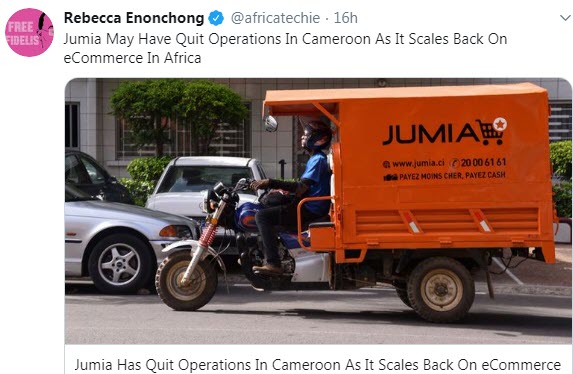African E-commerce Giant; Jumia has shut down her Cameroon online Shop and Fired all workers (A MUST READ !!!)
Yesterday Monday, 18th of November,2019 we learnt that Africa’s No 1 E-commerce company; Jumia (AKA the Amazon of Africa) had shut down her Cameroon online shop and reportedly fired all her workers in Cameroon.
As a reminder, Jumia Cameroon had warehouses in Yaoundé, Douala, Bafoussam, Maroua, Bamenda, Limbe,Buea and Kumba. More than 400 workers were allegedly working in the aforementioned warehouses before the shutdown.

News of the shut down of the Jumia Cameroon online shop, came as a big shock to the Jumia Cameroon workers as well as the thousands of Jumia Cameroon customers.The company shut its doors without any press release or statement from any official of the company.
News of the shut down of Jumia Cameroon was announced by Rebecca Enonchong; a world renown Anglophone Cameroonian Tech entrepreneur, Founder & CEO AppsTech (an IT company which has existed for 20yrs)
Enonchong has been a recipient of various awards from organizations such as the World Economic Forum.Forbes listed her as one of the 10 Female Tech Founders To Watch In Africa during 2014.
As a pioneer African tech expert, Enonchong has spent much of her career promoting technology in Africa. she is also one of the more followed sources for African tech news on Twitter, with over 92.5 thousand followers (as of November, 2019).
On the 18th of November, 2019, Rebecca Enonchong took to her twitter page (@Africatechie) to break the news about Jumia Cameroon shutdown.
Rebecca Enonchong tweeted….
Jumia shut down its Cameroon operations this morning, firing its entire staff, no public announcement, no special word from the group or its CEO. The brutality of the news to the staff echoes their management style and is, I believe, one of the reasons for its demise.
Jumia shut down its Cameroon operations this morning, firing its entire staff, no public announcement, no special word from the group or its CEO. The brutality of the news to the staff echoes their management style and is, I believe, one of the reasons for its demise.
— Rebecca Enonchong (@africatechie) November 18, 2019
Rebecca Enonchong also revealed that she has been following up the activities of Jumia Cameroon since the company began operations in Cameroon in 2014. She narrated a brief history of Jumia Cameroon and cited some reasons which may have caused Jumia to shut down operations in Cameroon.
Rebecca Enonchong cited reasons like lack of consideration for their feedback, fake merchandise and many other reasons.
Rebecca Enonchong said…
I watched this company from inception. When a young lady, newly arrived from France, was sent to start the Cameroon ops for Africa Internet Holdings, a @RocketBerlin subsidiary. I was introduced to her and of course knew Rocket. I was excited that they chose to come to Cameroon.
She was super young, and this was her first trip to Cameroon and really her first real job. She was very dynamic and I wanted to help. I offered her the use of my conference room at @AppsTech free of charge to help launch the company.
The first to launch was Kaymu, one of Rocket’s international brands. The team was hired and started working with the young lady in our offices. One of the group managers, also French also came. He was in charge of finance and admin for the region.
Eventually, they outgrew our offices. They first moved to
@ActivSpaces which is just one floor down. I thought it would be great for our startups to sit side by side with these execution giants, as Rocket was reputed to be.It was just a few months but already staff was treated with such disrespect. I remember of people fired for very petty stuff and They were ruthless. On the white board in the morning, the goals for signing up sellers. Every noon and end of day, staff had to give progress reports.
I admired their ability to stick to a plan but it also showed their total inflexibility in adapting to the market. The staff (all contractors because they weren’t allowed to hire), would come back with feedback from the field. No one cared. No adjustments would be made.
Eventually they also outgrew @ActivSpaces and moved to a large adjoining open space. Their regional admin head, another French guy, explained that they couldn’t sign any contract over 6 months because Paris HQ wanted the flexibility to shut down quickly if numbers not met.
Managers succeeded each other one after the other. I stopped to keep track of their names. With only a couple exceptions, the managers all came from France. Some were outstanding. Most were lost.
It became clearer to me that the now rebranded Jumia wasn’t at all interested in a long term business. They were interested in just a few KPIs that would look good to investors or possible acquirers. The pressure to make those numbers is same as what caused fraud in Nigeria.
I never once saw anyone from Nigeria involved in any capacity in my dealings with Jumia. It was either a local manager (usually French) or Paris. The one time a Cameroonian was sent to negotiate was to ask to reduce their rent. He said they were having difficulty making payroll.
Many of their staff members would complain primarily about the lack of consideration for their feedback. For instance Jumia Home didn’t account for agent commissions and therefore agents were hostile to the solution. The site was full of fake merchandise. This went on and on
I am one of those that believes that, if it wants to be successful, a company has to have good relationships with its community and all stakeholders, not just its shareholders. Jumia has been opposite of that.
The Samwer bothers stamped their corporate culture on Jumia and you can sense its disdain for staff, customers and suppliers in everything it does. ‘No developers in Africa,’ their CEO said. ‘Africa has no retail.’
Beyond #JumiaIsNotAfrican, $JMIA is simply a badly run business that is incapable of understanding its market, refuses to act as a good corporate citizen, and thinks Africans are simply a commodity, a means to an end. No business with that attitude can succeed in the long term.
Jumia refuses to report earnings by country, or by line of business. If any savvy reporter or investor required that info, the illusion of a 14 (now 13) country African e-commerce giant would quickly dissipate. The only thing giant about Jumia is their funding and their ego.
Before 2016, Jumia Cameroon experienced strong growth.
With the recent socio-economic and even the political situation, growth has declined sharply.
Cameroon’s economy is one of the largest in central Africa, but Jumia Cameroon growth has been hit by a two-year separatist uprising in its Anglophone North-west and South-west regions.And this may have motivated the decision of the shareholders to close Jumia’s Cameroon subsidiary.
“We came to the conclusion that our transactional portal as it is run today is not suitable to the current context in Cameroon,” Jumia said in a statement announcing that its e-commerce operations in Cameroon had been suspended.
Jumia’s mounting losses mean that it became imperative to cut costs lest the company runs out of cash and the closure of its Cameroonian subsidiary suggests the company is now scaling back on its e-commerce business.
Reuters reported that Jumia share price hit a record low of $4.96 after news break out on Monday that the company had shut down her Cameroon online shop.
It should be note that Jumia has not completely shut down all its Cameroon E-commerce platforms. The company said it would continue supporting buyers and vendors in Cameroon using its classified portal; Jumia Deals (https://deals.jumia.cm/). The company will be making money from advertisement fee on the Jumia deals website and not from the sale of items on jumia.cm (the main storefront).
The closure of Jumia Cameroon online store follows the closure of its businesses in both Congo and Gabon, signalling a tough e-commerce terrain in Central Africa. In 2018, Jumia also quit its core e-commerce business in Rwanda, continuing only its food delivery service, Jumia Food, in the East African country.
The Jumia company; founded in 2012 by two French former McKinsey consultants has grown quickly to become the continent’s leading e-commerce firm.
At present, Jumia can still lay claim to having a presence in 13 African markets including Nigeria, Kenya, South Africa, Egypt, Ghana, Morocco, Uganda, Tanzania, Senegal, Rwanda, Ivory Coast, Tunisia, and Algeria.
However with the closure of online shops in Cameroon, Congo and Gabon, many tech experts are of the opinion that Jumia may have given up on its dream of becoming the Amazon of Africa.
Comments
0 comments







